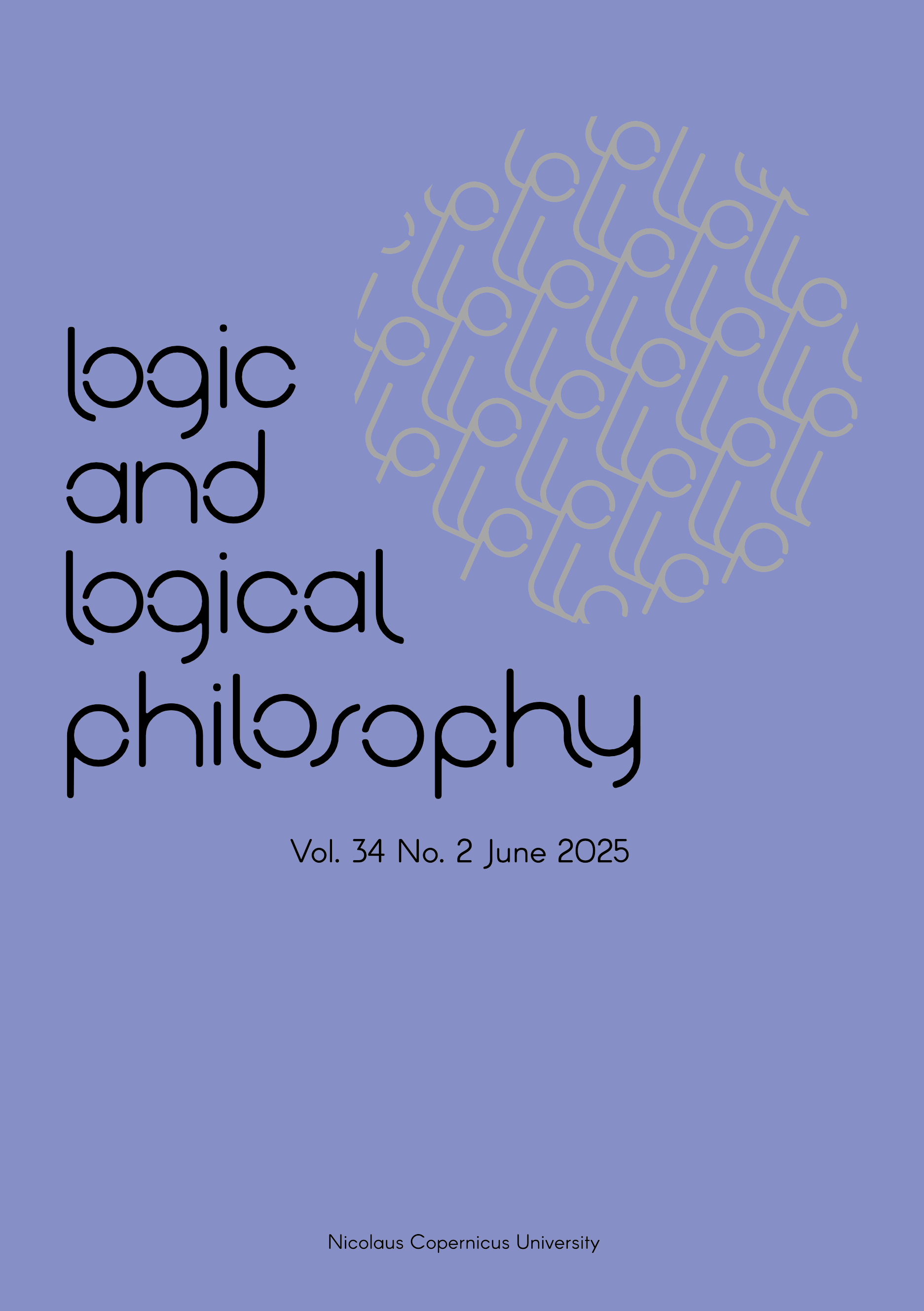Comparing Expressiveness of Logics Defined within Different Classes of Models
An analysis of some formal conditions
DOI:
https://doi.org/10.12775/LLP.2024.032Słowa kluczowe
model-theoretic logics, model-mappings, relative expressiveness, formal conditionsAbstrakt
It is possible to understand the expressive power of a logic as issuing from its capacity to express properties of its models. There are some ways to formally capture whether a property of models is expressible, among them is one based on the notion of definability, and one based on the notion of discrimination. If the logics to be compared are defined within the same class of models, one can employ the notions of definability and discrimination directly to obtain formal conditions for relative expressiveness. This paper studies generalizations of these formal conditions to cases where the compared logics are defined within different classes of models. There have been proposed in the literature formal conditions of two main kinds: with forward and with backward model-mappings. It is shown that none of them is adequate, despite their initial reasonableness. Moreover, we argue that general and reasonable formal conditions for relative expressiveness involving forward mappings are not likely to be found, given that they turn out to be highly dependent on specific features of the compared logics. On the other hand, it will be argued that there is a reasonable formal condition involving backward model-mappings.
Bibliografia
Broersen, J., A. Herzig and N. Troquard, 2006a, “From coalition logic to stit”, Electronic Notes in Theoretical Computer Science, 157: 23–35. DOI: https://doi.org/10.1016/j.entcs.2006.02.011
Broersen, J., A. Herzig, and N. Troquard, 2006b, “Embedding alternating- time temporal logic in strategic stit logic of agency”, Journal of Logic and Computation, 16: 559–578. DOI: https://doi.org/10.1093/logcom/exl025
Ebbinghaus, H., 1985, “Extended logics: The general framework”, in J. Barwise and S. Feferman (eds.), Model-theoretic Logics, Perspectives in Mathematical Logic, Springer-Verlag.
Epstein, R., 2013, The Semantic Foundations of Logic, Volume 1: Propositional Logics, contributors: W. Carnielli, I. M. d’Ottaviano, S. Krajewski and R. D. Maddux, Nijhoff International Philosophy Series. Springer Netherlands. DOI: 1 https://doi.org/0.1007/978-94-009-0525-2
Fernandes, D., 2023, “On comparisons of logics in terms of expressive power”, Manuscrito, 46: 1–45. DOI: https://doi.org/10.1590/0100-6045.2023.V46N4.DF
García-Matos, M., and J. Väänänen, 2007, “Abstract model theory as a framework for universal logic”, pages 19–33 in J.-Y. Beziau (ed.), Logica Universalis, Birkhäuser Basel. DOI: https://doi.org/10.1007/978-3-7643-8354-1_2
Gasquet, O., and A. Herzig, 1996, “From classical to normal modal logics”, pages 293–311 in H. Wansing (ed.), Proof Theory of Modal Logic, Springer Netherlands, Dordrecht. DOI: https://doi.org/10.1007/978-94-017-2798-3_15
Goranko, V., and W. Jamroga, 2005, “Comparing semantics of logics for multi-agent systems”, pages 77–116 in Information, Interaction and Agency, Springer Netherlands, Dordrecht. DOI: https://doi.org/10.1007/1-4020-4094-6_3
Kocurek, A., 2018, “What can you say? Measuring the expressive power of languages”, PhD thesis, University of California, Berkeley, USA. https://philpapers.org/archive/KOCWCY.pdf
Kuijer, L. B., 2014, “Expressivity of logics of knowledge and action”, PhD thesis, University of Groningen, Groningen, Netherlands. http://www.rug.nl/research/portal/files/15492763/Complete_dissertation.pdf
Manzano, M., 1996, Extensions of First-Order Logic, Cambridge Tracts in Theoretical Computer Science, Cambridge University Press.
Mossakowski, T., R. Diaconescu and A. Tarlecki, 2009, “What is a logic translation?”, Logica Universalis, 3(1): 95–124. DOI: https://doi.org/10.1007/s11787-009-0005-2
Thomason, S. K., 1974, “Reduction of tense logic to modal logic. I”, Journal of Symbolic Logic, 39(3): 549–551. DOI: https://doi.org/10.2307/2272895
Pobrania
Opublikowane
Jak cytować
Numer
Dział
Licencja
Prawa autorskie (c) 2024 Diego Fernandes

Utwór dostępny jest na licencji Creative Commons Uznanie autorstwa – Bez utworów zależnych 4.0 Międzynarodowe.
Statystyki
Liczba wyświetleń i pobrań: 924
Liczba cytowań: 0







